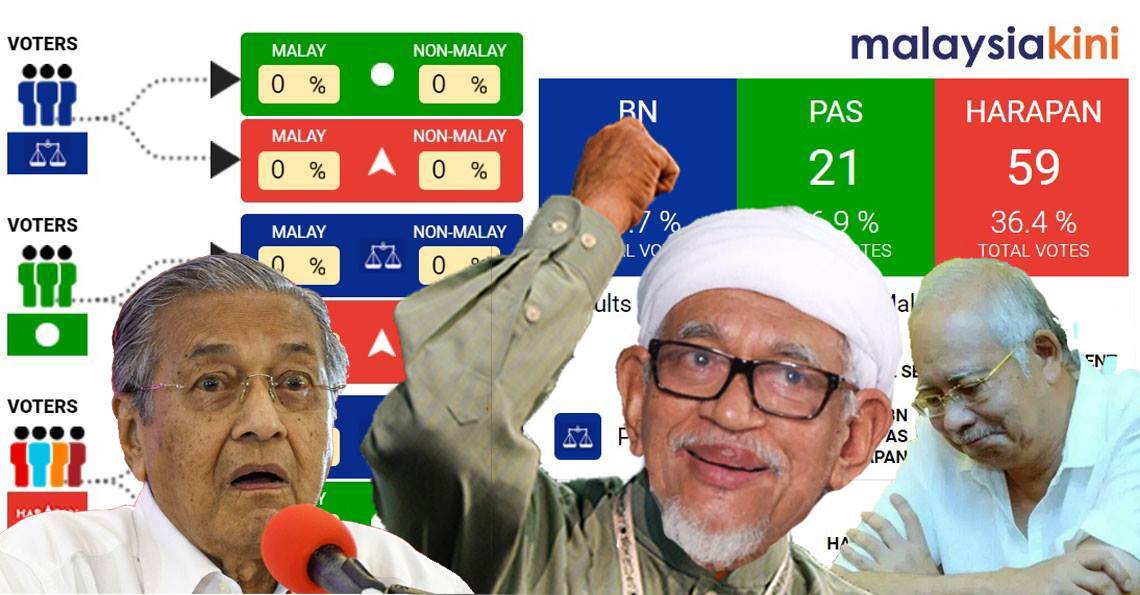Survey shows 4 ways Malaysians’ concerns have changed since GE14
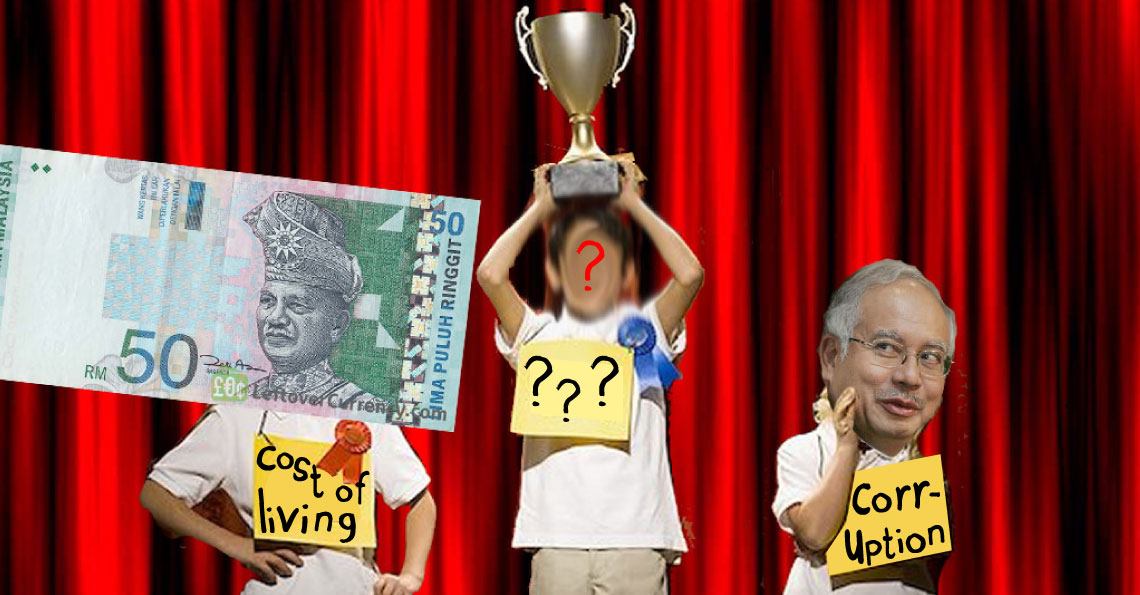
- 299Shares
- Facebook258
- Twitter2
- LinkedIn11
- Email5
- WhatsApp23
While we’re still talking about the 1st anniversary of New Malaysia, Ipsos (haha i p sos) published its “What Worries Malaysia 2019” study recently (kinda) to show what Malaysians think of the PH govt’s progress and literally what issues they’re most worried about. FYI, Ipsos is an independent market research company which is controlled and managed by research professionals.
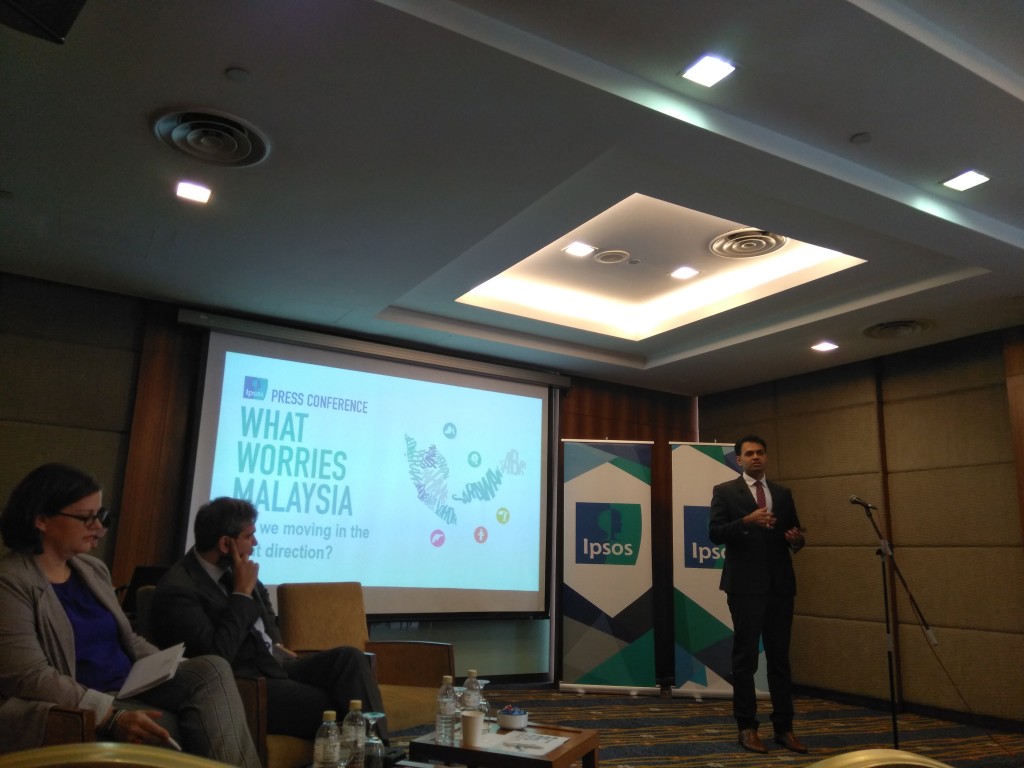
It was part of its latest “What Worries The World” survey as of March 2019 where Malaysia was among the 28 countries surveyed via the Ipsos Online Panel system between 22nd Feb 2018 and 8th March 2019 (ages of Malaysians interviewed between 16 and 64 years).
Although the Dept of Stats Malaysia claimed that Malaysia’s internet penetration (percentage of total population with Internet access) rose to 85.7% in March last year, Malaysia was still considered in this study as one of the 11 countries with lower levels of internet penetration, which meant that the Malaysian sample for this survey might be a bit more affluent than other countries.
Overall, this study concluded that 43% of the Malaysians surveyed believe that the country is heading in the wrong direction, rising from 36% three months before. The growing momentum of this perception arose from the top concerns highlighted in this study and these concerns have also shifted over the past year. We look at these issues.
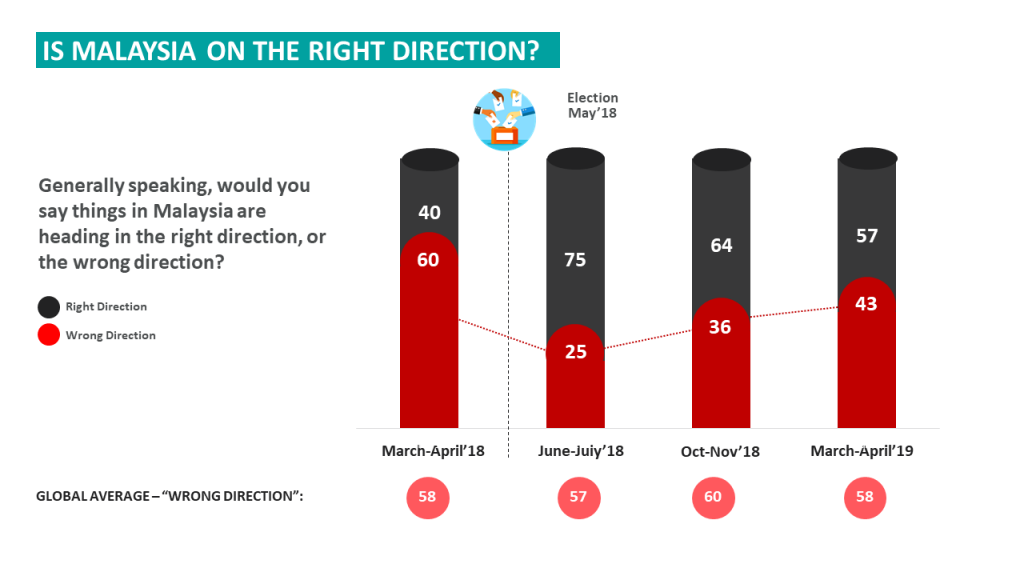
1. Corruption is less of an issue (*whew*)
According to the study, corruption used to be the top worry a year ago, especially for 47% of Malaysians who considered it a huge concern. But now, although it still remains to be a major worry for 32%, it has gone down to 3rd place.
This can be backed up by the Corruption Perceptions Index (CPI), which ranks 180 countries and territories by their perceived levels of public sector corruption and uses a scale of 0 to 100 (0 for highly corrupt and 100 for very clean). For 2018, Malaysia’s corruption score is 47/100, placing it at 61st place (for 61st cleanest country). That’s a small improvement from 2017 when Malaysia was placed at 62nd place.
Ipsos claimed that the govt’s stepped up efforts to combat corruption has probably led to corruption’s decreased rank. It started right after Tun M was sworn in as PM again last year when he mentioned plans to investigate govt agencies for corruption, starting with the reshuffling of govt agency heads (remember Apandi Ali and Dzulkifli Ahmad?) and the 1MDB trial, which gave a headstart to the war against corruption.
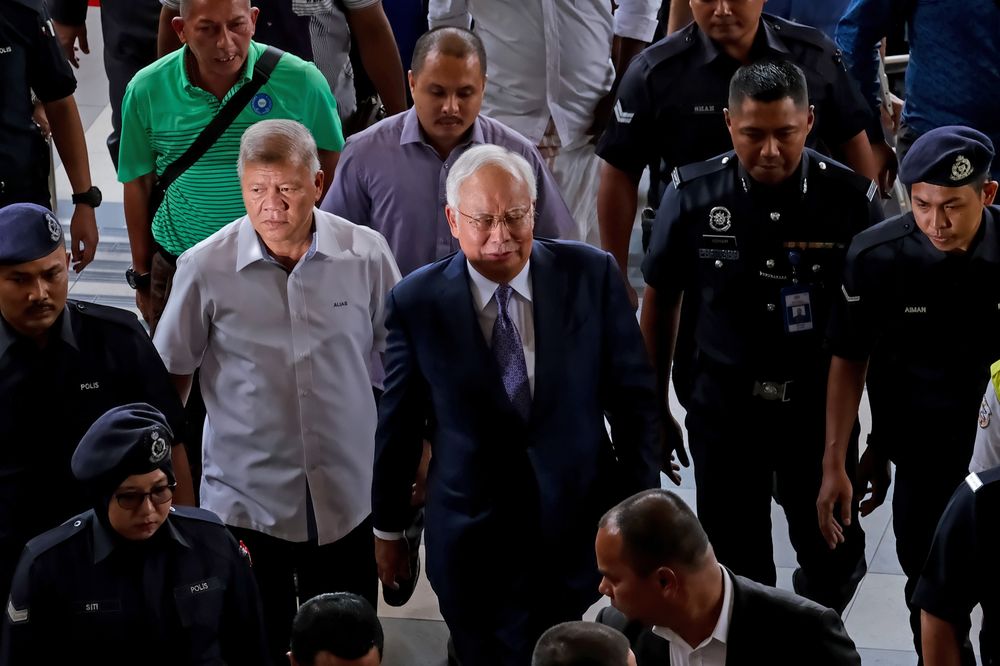
Since then, many corruption scandals such as EPF, Tabung Haji, HRDF, JPJ etc were exposed. However, Tun M pointed out that the PH govt has been losing some support because of its fight against corruption, which explains the concern about where the country is heading.
“… we find that these people do not get any money now because of the anti-corruption measures. They are angry with the government… previously they were getting (the money), not anymore.” – Tun M.
Since corruption is not in 1st place anymore…
2. Crime is the new top concern, but it’s still down from 2018
Snatching the top spot from the concern for corruption is the concern for crime and violence. However, the study found that the current percentage of those concerned about this issue has actually dropped by a small margin, from last year’s 40% to this year’s 39%.
Decreasing crime rates have been recorded lately, with a drop of 11.9% in 2018 compared to 2017 according to IGP Mohd Fuzi Harun. And our country’s crime index went down to 60.79 this year from 61.15 in mid-2018.
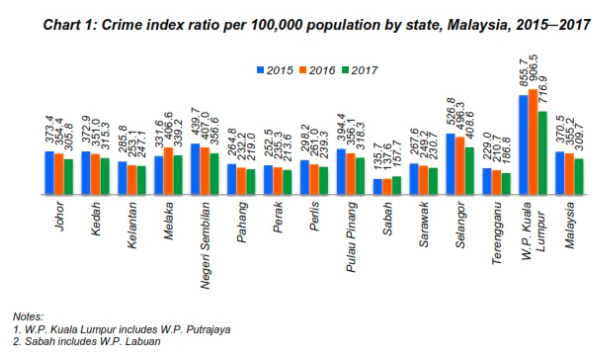
But that didn’t mean that crime has really gone down, has it? In one of our previous articles, we wrote about how the crime rate figures may not represent the actual crime rate becos the crime index used in Malaysia excludes many forms of crime such as prostitution, gambling, drug abuse, vandalism, embezzlement etc (and also unreported crime).
Tho people aren’t just worried about their safety…
3. The urban young and poor spend most of their money on food
Other things bothering the Malaysian public are socioeconomic factors which affect one’s livelihood like inflation, living cost, income inequality and unemployment. The study showed that Inflation/Cost of Living climbed to 2nd place with 34% from 3rd place, while Unemployment & Jobs (28%) and Poverty & Inequality (31%) swapped the 4th and 5th positions with each other.
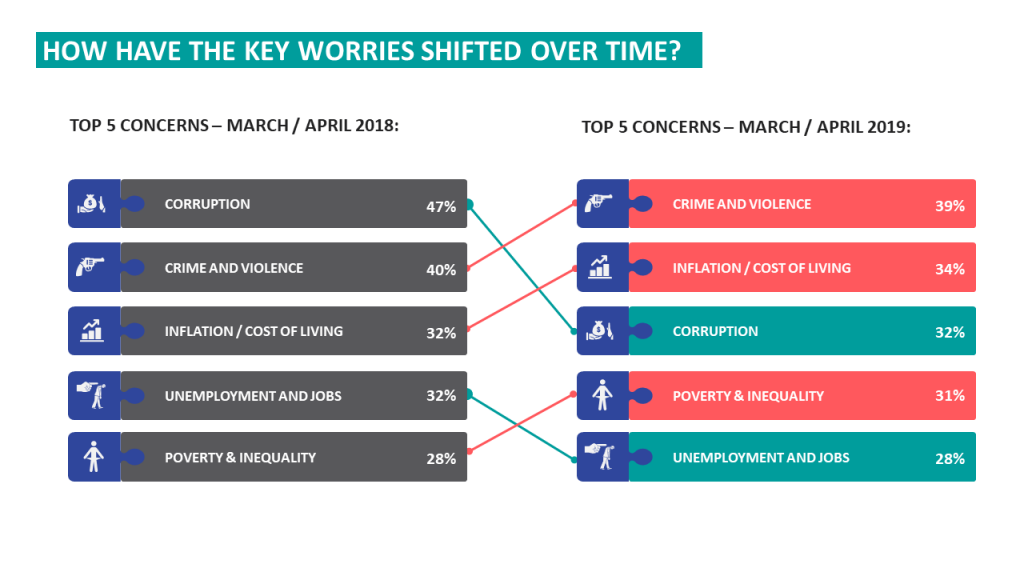
Shortly after GE-14, the inflation rate dropped below 1% for the first time in 40 months, one of it due to the abolishment of GST. But this year, inflation rose back up, with the highest inflation rate in KL at 0.9% in March because of food inflation.
The Ipsos study explained that urban youth and low income groups are most affected by inflation and living costs. According to a report by the World Bank, 20% of Malaysian households whose monthly incomes are less than RM3,000, pay about 40% of their budget on food, especially in urban areas.
This could be why, despite having faith in the PH govt, a poll by Merdeka Centre found that slightly more than half of the rakyat surveyed were still unhappy with the cost of living.
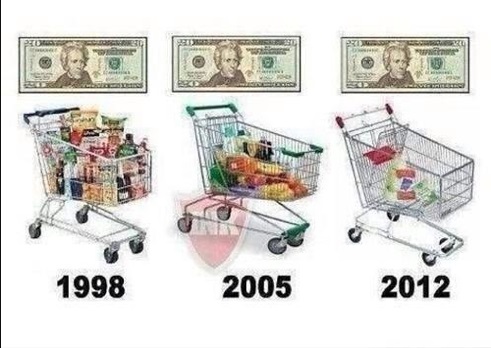
The people, though not as many, are also worried about poverty and inequality. Despite beating our neighbours at reducing income gaps, a study by Khazanah Research Institute (KRI) found that this gap has widened since the 2008 Global Financial Crisis.
So, the govt is paying closer attention to helping the B40 deal with the rising living costs, with initiatives like National Food Bank and Bantuan Sara Hidup (BSH). However, Lembah Pantai MP Fahmi Fadzil said that, to provide aid to the poor more effectively, the measurement for poverty threshold should not be generalised, as socioeconomic conditions differ geographically (like how we mentioned earlier that inflation in KL was the highest).
“The cost of living in Kuala Lumpur, for instance, is higher than Kuala Kubu Bharu (in Selangor), Kota Bharu (Kelantan) or Johor Baru (Johor). So, we have to look at the statistics based on the geographical (factor) because living in cities with many people to care for is hard, even with an income of RM1,200.” – Fahmi Fadzil.
These socioeconomic factors could explain why owning a first home is increasingly far-fetched for many Malaysians, among the many socioeconomic issues. And these are just problems faced by employed Malaysians, who make up about 96.8% of the population. Speaking of the economy, businesses are not having it any easier either.
4. Lim Guan Eng believes in the economy… but businesses don’t
In a separate segment on “What Worries Malaysian Businesses”, Ipsos found that businesses are now not as confident in the economy as they were right after GE-14. Last year, businesses gave an average rating of 3.72 for the govt’s performance in developing economic policies.
But now, that rating has dropped to 2.91, mainly due to the uncertainty about the direction of economic policies and the expectation of a slowing economy. Hence, there was a slight drop in optimism about their business prospects in Malaysia from an index of 3.5 to index of 3.13.
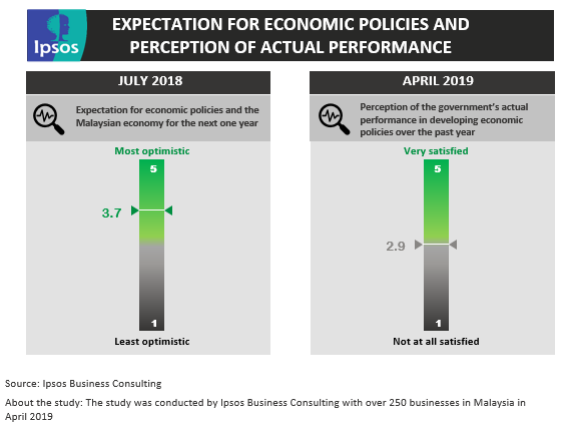
Looking back at the PH govt’s first year in office, there were initially some challenges, like cancelling projects to cut costs and the Ringgit weakening to its lowest 2018 level last August. But after a while, Lim Guan Eng claimed that the economy is actually doing well. He even said that Malaysia will return to Asian Tiger status in 3 years due to a boost in investments here.
“Despite all these headwinds, let us not forget that the Malaysian economy is fundamentally strong and resilient.” – Lim Guan Eng.
But there’s still room for improvement, especially when it comes to how confusing media content about economic policies can be because there’s actually too much info which can often be inconsistent. We could see this in the uncertainty in the ECRL project status and the fate of the NEP (Tun M said may still need pro-Malay economic policies. But Azmin said that such policies would be reviewed to benefit “all Malaysians”).
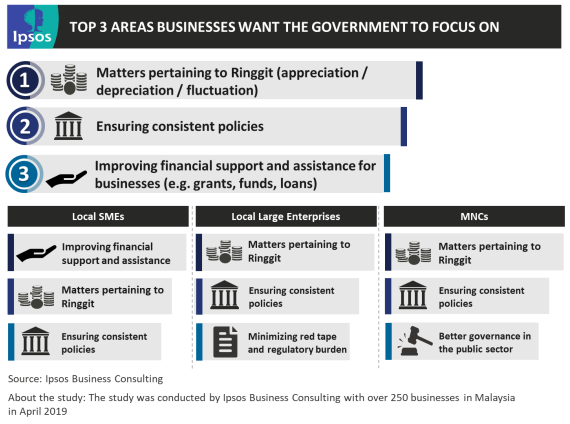
With all that said…
Different government, different concerns
Yes, Malaysians are less worried about corruption, but that’s been replaced by concerns with crime, rising costs of living, and the economy.
Let’s be clear about this. There are still many issues for the new government to address – the stagnating economy, laws that were meant to be repealed, as well as the key issue of identifying which issues to deal with first.
The little progress made on PH’s election manifesto promises and inconsistency in decisions hinging on issues like the Rome Statute, ICERD and LGBT rights would have made many of this study’s respondents think that the PH govt is heading in the wrong direction, and sadly different sides are thinking in opposite directions.
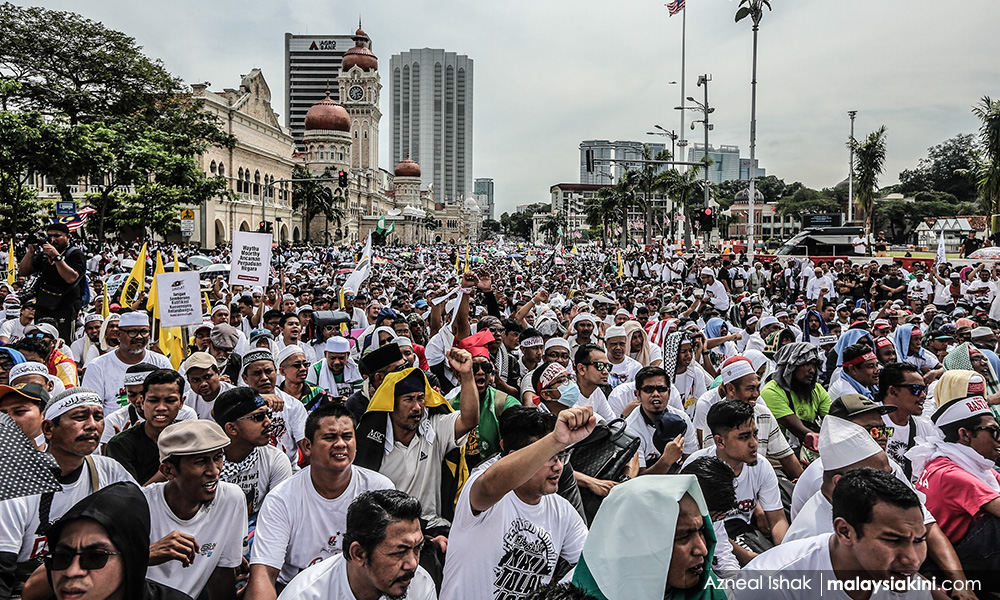
Adding to this, Setiawangsa MP Nik Nazmi said that PH needs to commit itself to fulfilling the promises while Tun M said that the coalition must bekerjasama to prevent Malaysia from becoming a “failed state”.
But PH still has significant support, maybe because it has brought about some improvements. Remember the post GE-14 press freedom? Shortly after the switch in power, Malaysia jumped up to 123rd place out of the 180 countries listed in the World Press Freedom Index. However, one year may still be too short of a deadline for the PH govt to prove itself.
“We must allow the full run of the five years before coming to any judgement and evaluation of the Pakatan Government.” – Rafidah Aziz.
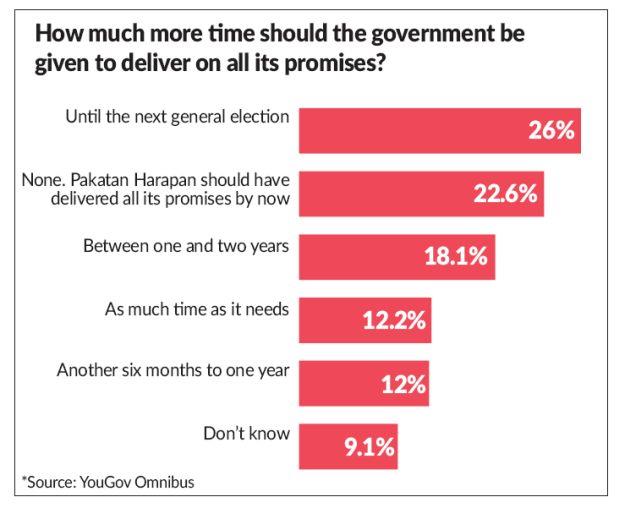
Echoing her was Daim Zainuddin, who said that the PH govt needs another six months to repair the previous govt’s damage. And the rakyat agrees as well. In a YouGov Omnibus survey, when asked how much more time the govt should be given to fulfill its promises, the most popular response was until the next general election. Whether the PH govt is doing well or not, we’ll find out in 4 years.
- 299Shares
- Facebook258
- Twitter2
- LinkedIn11
- Email5
- WhatsApp23


